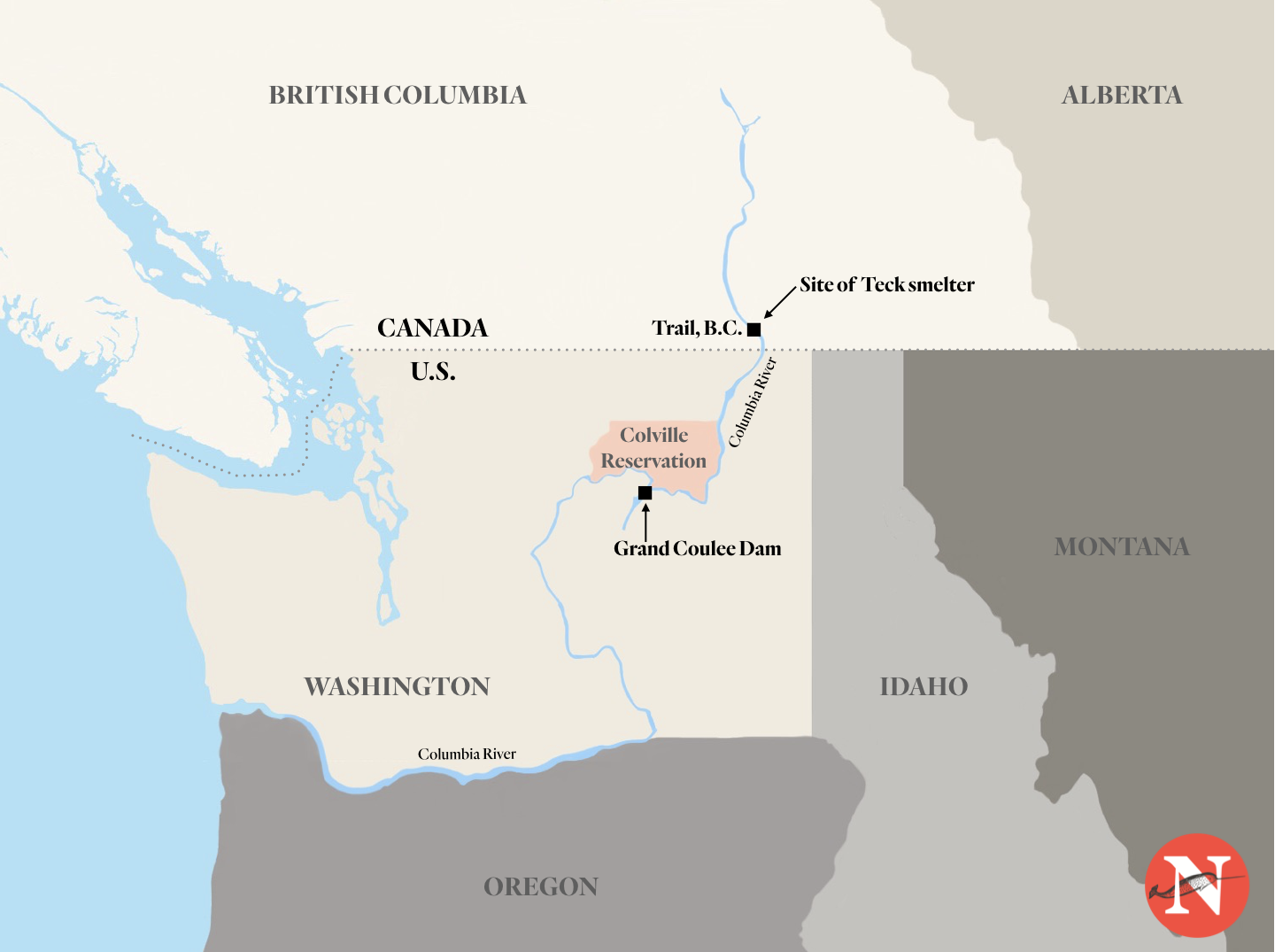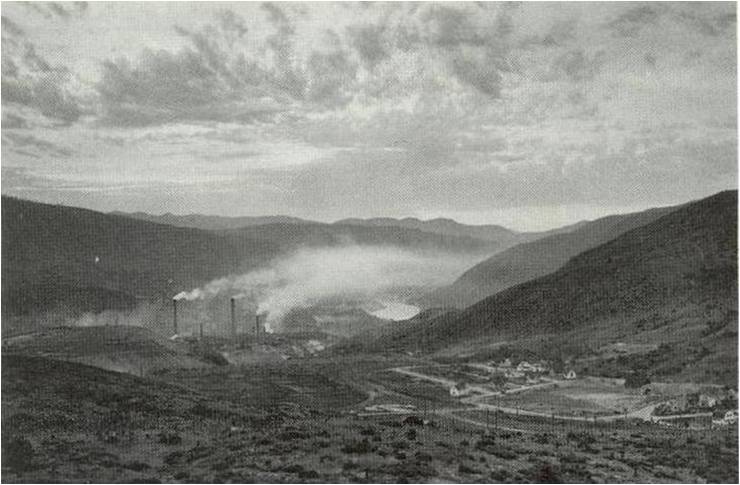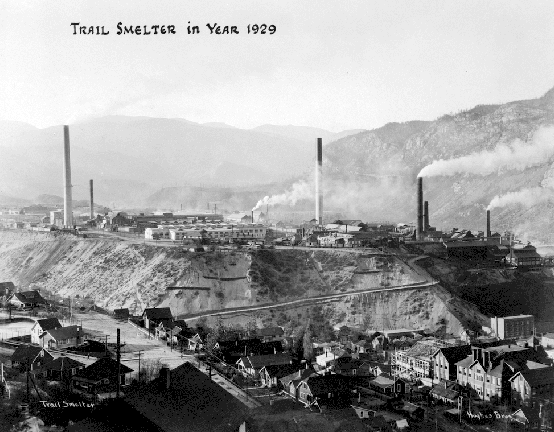
What’s scarier for Canadian communities — floods, or flood maps?
When maps showing areas most likely to flood are outdated, it puts people and property...
Slag from a giant lead and zinc smelter in Trail B.C. has polluted Washington State waterways for so long that part of the shoreline has turned black and, after years of legal wrangles, the Confederated Tribes of the Colville Reservation are now celebrating a U.S. federal appeals court ruling that Teck Cominco Metals is responsible and owes the tribes millions of dollars.
The Ninth Circuit Court of Appeals has upheld an $8.25 million judgement made by a lower court that found Teck Metals, a subsidiary of Vancouver-based Teck Resources, was responsible for decades of toxic smelter waste that flowed down the Columbia River into Lake Roosevelt, a reservoir formed by the Grand Coulee Dam.
The court determined that the company owes the Colville Tribes for its legal costs and the cost of investigating the pollution.
The ruling says that, between 1930 and 1995, Teck discharged about 400 tons of slag daily — an estimated 9.97 million tons in total — directly into the Columbia River.
“These solid and liquid wastes contained roughly 400,000 tons of the heavy metals arsenic, cadmium, copper, lead, mercury and zinc, in addition to lesser amounts of other hazardous substances,” it says.
The Teck smelter is believed to be the world’s largest lead and zinc smelter and the Tribes estimate that about 240 kilometres of the river have been affected by slag or heavy metals.

Teck Resources was found guilty of dumping 9.97 million tons of contaminated waste into the Columbia River, a transboundary river that runs from British Columbia to Washington State. Illustration: Carol Linnitt / The Narwhal
Over the course of legal actions brought against Teck — which extend back to 1999 — the company has argued that the courts lacked jurisdiction over the company, that many other industrial operations contributed to the pollution and that the company was not “purposefully” dumping waste into the river knowing it would cross the border into the U.S. — all arguments rejected by the court.
“It is inconceivable that Teck did not know that its waste was aimed at the state of Washington when Teck deposited it into the powerful Columbia River, just miles upstream of the border,” Judge Ronald M. Gould wrote in the 55-page ruling.
A study commissioned by the tribes found that the waste matched the Trail smelter’s “isotopic and geochemical fingerprint.”

Teck Resources’ Trail smelter in the early 1900s. Photo: Ecology Washington

Trail smelter, circa 1929. Photo: B.C. Government Archives
The Colville Tribes were joined by the State of Washington as co-plaintiffs in 2004, with both the Tribes and State arguing that Teck should be found liable under the Comprehensive Environmental Response, Cleanup and Liability Act.
“This is a unique case, not only because a Canadian mining company has been found liable under U.S. law, but because an Indian Tribe and a state have joined forces to protect a shared, treasured resource — the Columbia River,” said Colville Business Council Chairman Rodney Cawston.
The ruling means that the polluter, not U.S. taxpayers, will pay the cost of remedial action, he said.
However, Cawston is cautious about the prospects of the long legal battle coming to an end and believes, that based on previous behaviour, Teck is likely to appeal.
The company has 90 days to petition the U.S. Supreme Court for a hearing.
“If they want to do the right thing, they will acknowledge all the damage and their responsibility to clean that up and work with the Tribe in honouring that settlement,” Cawston said.
“Facing the enormity of the decision I wouldn’t be surprised if they file an appeal…as a corporation they are going to look for the most economically feasible way out of this and, if that means fighting us in court, well, up until this point, that’s what they have chosen to do,” he said.
Teck spokesman Chris Stannell said in an e-mailed statement to The Narwhal that the company is disappointed by the decision and is reviewing it with counsel.
However, the decision will not affect Teck’s ongoing work to identify potential risks in the Upper Columbia River associated with historical operations at the Trail facility, he said.
So far, Teck has invested more than $85-million U.S. towards a study — under the oversight of the U.S Environmental Protection Agency — and if unacceptable risks are identified, they will be addressed, Stannell wrote.
“Results to date are encouraging and the Upper Columbia River remains an important recreational destination, with excellent water quality and restrictions on fish consumption that compare favourably to other water bodies in Washington State,” he said.
“Since the late 1970s Teck has invested approximately $1.5 billion to improve the operation’s environmental performance. As a result, emissions to air and water have been reduced by over 95 per cent,” Stannell wrote.
Teck stopped discharging slag in the Columbia River in 1995, but that does not mean the problem has gone away and more pollution constantly flows down the river from residual slag, Cawston said.
“It will take years to do the cleanup, even if they start today. We are going to be living with this situation for a while,” he said, describing it as a never-ending battle.
The pollution has affected fish habitat and water quality and heavy metals have been found in sturgeon which the Tribes are working to restore, Cawston said.
“We want the aquatic land to be cleaned up. There’s even an area called black sand beach that’s basically an area where all the slag that is coming down the Columbia is being deposited. It’s really black,” he said.
The Tribes have been in the area for thousands of years and it is difficult to persuade people that they cannot fish and swim in the traditional areas, he said.
“It’s a huge issue to us. It’s really hard to keep people away from those areas. Culturally and traditionally our people have used those waters since time immemorial.”
The Colville Tribes are made up of 12 bands whose territories cover much of northern Washington and extend into the Arrow Lakes region of B.C.
Enbridge Gas will face Waterloo Region in a hearing before the Ontario Energy Board to renew an agreement that would allow the company to continue...
Continue reading
When maps showing areas most likely to flood are outdated, it puts people and property...

We’re suing the RCMP for arresting a journalist on assignment for The Narwhal. It’s an...

As glaciers in Western Canada retreat at an alarming rate, guides on the frontlines are...